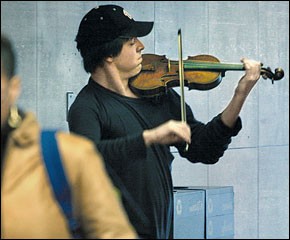Joshua Bell and the New York Philharmonic
Antonio Pappano of Covent Garden Conducts
By: Susan Hall - Apr 09, 2010
Antonio Pappano, Conductor
Joshua Bell, Violin
Mozart, Symphony No. 31 in D major, Paris
Bruch, Scottish Fantasy for Violin and Orchestra, Op. 46
Brahms, Symphony No. 4 in E Minor, Op 98
Avery Fisher Hall
Lincoln Center
New York City
Program repeated April 9, at 11 am, and April 10, at 8 pm
For information: 212-875-5656
This evening was about the power of attraction. Two consummate performers in the music world, Joshua Bell, Violin, and Conductor, Atonio Pappano, who draw crowds wherever they go, signified the excitement and pleasure of great music in the hands of superb performers at Avery Fisher Hall.
While symphonies struggle to fill their halls in a down economy, Bell sells out wherever he performs. He'd be the first to tell you that the only time he didn't get much attention was when he tried performing outside a subway station and no one recognized him.
Bell performed Max Bruch's Scottish Fantasy after the orchestra played Mozart's Symphony No. 31, the Paris, and before the Brahms Fourth Symphony. The conductor, Antonio Pappano is an arresting figure on the podium. He is music director for the Royal Opera House, Covent Garden.
Both Bell and Pappano frame their palpable emotions with drama and visuals like blown-dry hair that flies as they move to the music's beat. No drawn back pony tales or Mohawks here. For Pappano, every gesture, and movement of lips, arms, a dip of the knee, contributes to the impression of intense command. Between movements he leans back into the railing as though he were in a savasana yoga pose.
What he gets for this from the orchestra is a neat, vertical sound. The Mozart was particularly light and crisp, and the Brahms was lush. Pappano is unquestionably exciting to watch and one of the new guard, like the Philharmonic music director, Alan Gilbert, who attracts attention wherever he goes.
In choosing the Bruch, Bell tackled the signature piece of legendary violinist Jascha Heifetz, whose performance of the Scottish Fantasy is readily available on YouTube. Heifetz gets about 40,000 hits compared to Bell's 200,000. Listening to Bell live, his take on the piece is warmer and more colored than Heifetz Bell's bravery in going up against the master is richly justified.
The Scottish Fantasy is based on Scotch folk songs, among them "Auld Rob Morris" "The Dusty Miller"" and "I'm Down for Lack of Johnnie." Using folk music as bait is very much in fashion. Thomas Hampson, this year's artist in residence at the Philharmonic, is spear-heading an American song project with the Library of Congress.
Bruch made the argument that "a good folk tune is more valuable than a hundred works of artÂ….There is nothing to compare with the feeling, power, originality and beauty of the folk song." Bruch thought he was different and more inventive than Brahms, however. He reported that sitting with Brahms in a restaurant in Vienna, he heard a band play the first G minor Hungarian dance in 2/4 "exactly as Brahms later published it." Appropriation or adaptation?
Earlier Bruch had selected "Scots wha hae" to set for voice and piano and announced in a letter that using these "wonderful, unknown melodiesÂ… revealed my musical credo quite clearly."
When violinist Joseph Joachim came to Liverpool to perform the Scottish Fantasy, his marriage was collapsing. Amalie Bruch cancelled her singing engagement, because she was so distraught.. Brahms and Bruch remained loyal to her, but Brahms' relationship with Joachim never recovered and his performance of the Scottish Fantasy disappointed Bruch. "...in the scherzo he lacked Sarasate's (another violinist's) charm and grace, the cantilena in the first and third movements was too restless, the series of trills in the Finale were slow and the top notes completely missed." Bell succumbed to none of the above in his scintillating rendition.
The Fantasy was trashed by critics at its first performance. Bruch wrote to a publisher, "The Scottish Fantasy gives pleasure to people like Joachim and Brahms, is torn apart everywhere by the mob of critics. One can bear all this for many years, but there comes a time when disgust and bitterness overpowers a creator, and one says to myself 'how much longer can one cast pearls before the swine.' " Bruch claimed to have given body and soul to this piece.
George Bernard Shaw who did not like Bruch's work, wrote that the Scottish Fantasy was much better than his concertos. However he said "Bruch's work, passionate and grandiose at best, lively and interesting at worstÂ…is very superior to what we can turn out here (in England) "
Composer Christopher Rouse has a particular love for percussion, and it was suggested that a young man studying drums look up his pieces for percussion on YouTube. Rouse memorably composed Odna Zhizn for the Philharmonic this year.
Two very young violinists from New York were also in the audience. Their grandfather, an Iranian who drives a town car and has a small fleet of medallion cabs, introduced them to Alice, a friend of Joshua Bell's, and they couldn't wait to get backstage.
Two weeks ago Lang Lang, the Chinese pianist, performed a Chopin Polonaise at the Apple store a few blocks up from the Avery Fisher Hall. The place was filled with tiny tots carrying their stringed instruments in cases as big as they were.
All these are signs that classical music is alive and well. With performances as exciting as the one last evening, classical music lives, particularly at the New York Philharmonic.



